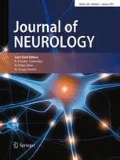Abstract
Two patients with a slowly progressive and severe motor apraxia are presented. In one case, there was only apraxia; in the other there was moderate memory disturbance and a mild decline of global intellectual ability, suggesting a more widespread cognitive dysfunction. In this second case, recognition of the correct use of objects was also severely impaired, suggesting a disturbance of motor knowledge. In both cases, apraxia was asymmetrical, and associated with a contralateral atrophy of the upper parietal cortex, suggesting a differential involvement of separate action systems for each hand.
Similar content being viewed by others
References
Benson DF, Cummings JL, Tsai SY (1982) Angular gyrus syndrome simulating Alzheimer's disease. Arch Neurol 39:616–620
Benson DF, Davis RJ, Snyder BD (1988) Posterior cortical atrophy. Arch Neurol 45:789–793
Bergego C, Pradat-Diehl P, Durand E, Lauriot-Prevost MC (1991) Reconnaissance de l'utilisation correcte d'objets sur photographies, étude sur deux cas d'apraxie. Communication, Société de Neuropsychologie de Langue Française, Strasbourg
Binois R, Pichot P (1947) Test de vacabulaire. Editions du Centre de Psychologie Appliquée, Paris
Cambier J, Masson M, Dairou R, Henin D (1981) Etude anatomo-clinique d'une forme pariétale de maladie de Pick. Rev Neurol (Paris) 137:33–38
Crystal HA, Horoupian DS, Katzman R, Jotkowitz S (1982) Biopsy-proved Alzheimer disease presenting as a right parietal lobe syndrome. Ann Neurol 12:186–188
DeRenzi E (1986) Slowly progressive visual agnosia or apraxia without dementia. Cortex 22:171–180
DeRenzi E, Lucchelli F (1988) Ideational apraxia. Brain 111: 1173–1185
Dick JPR, Snowden J, Northen B, Goulding PJ, Neary D (1989) Slowly progressive apraxia. Behav Neurol 2:101–104
Freedman L, Selchen DH, Black SE, Kaplan R, Garnett ES, Nahmias C (1991) Posterior cortical dementia with alexia: neurobehavioral, MRI and PET findings. J Neurol Neurosurg Psychiatry 54:443–448
Freund HJ (1987) Abnormalities of motor behavior after cortical lesions in humans. In: Mountcastle VB (ed) Handbook of physiology, section I, The nervous system, vol V, part 2. American Physiological Society, Bethesda, pp 763–810
Geschwind N (1965) Disconnection syndromes in animals and man. Brain 88:237–294, 585–644
Graff-Radford NR, Damasio AR, Hyman BT, Hart MN, Tranel D, Damasio H, Van Hoesen GW, Rezai K (1990) Progressive aphasia in a patient with Pick's disease: a neuropsychological, radiologic and anatomic study. Neurology 40:620–626
Hecaen H, Gimeno Alava A (1960) L'apraxie idéomotrice unilatérale gauche. Rev Neurol (Paris) 102:648–653
Heilman KM, Rothi LJG (1985) Apraxia. In: Heilman KM, Valenstein E (eds) Clinical neuropsychology. Oxford University Press, New York, pp 131–150
Heilman KM, Rothi LJ, Valenstein E (1982) Two forms of ideomotor apraxia. Neurology 32:342–346
Kirshner HS, Tanridag O, Thurman L, Whetsell WO (1987) Progressive aphasia without dementia: two cases with focal spongiform degeneration. Ann Neurol 22:527–532
Laplane D, Degos JD (1983) Motor neglect. J Neurol Neurosurg Psychiatry 46:152–158
Leger JM, Levasseur M, Benoit N, Baron JC, Tran Dinh S, Bolgert F, Cohen L, Brunet P, Signoret JL (1991) Apraxie d'aggravation lentement progressive: étude par IRM et tomographie à positions dans quatre cas. Rev Neurol (Paris) 147:183–191
Magnani G, Bettoni L, Mazzucchi A (1982) Lesioni atrofiche bioccipitali di incerta nature all'origine di una agnosia visiva. Riv Neurol 52:137–148
Mazaux JM, Orgogozo JM (1983) Echelle d'évaluation de l'aphasie. EAP, Issy-les-Moulineaux
Mesulam MM (1982) Slowly progressive aphasia without generalized dementia. Ann Neurol 11:592–598
Mesulam MM (1987) Primary progressive aphasia. Differentiation from Alzheimer's disease. Ann Neurol 22:533–534
Pilgrim E, Humphreys GW (1991) Impairment of action to visual objects in a case of ideomotor apraxia. Cogn Neuropsychol 8:459–473
Poeck K (1986) The clinical examination for motor apraxia. Neuropsychologia 25:129–134
Poeck K, Lehmkuhl G (1980) Ideatory apraxia in a left handed patient with right-sided brain lesion. Cortex 16:275–284
Poeck K, Luzzati C (1988) Slowly progressive aphasia in three patients. The problem of accompanying neuropsychological deficit. Brain 111:151–168
Rothi LJG, Ochipa C, Heilman KM (1991) A cognitive neuropsychological model of limb praxis. Cogn Neuropsychol 8: 443–458
Signoret JL (1991) Batterie d'Evaluation Mnésique 144. Elsevier, Paris
Author information
Authors and Affiliations
Rights and permissions
About this article
Cite this article
Azouvi, P., Bergego, C., Robell, L. et al. Slowly progressive apraxia: two case studies. J Neurol 240, 347–350 (1993). https://doi.org/10.1007/BF00839965
Received:
Revised:
Accepted:
Issue Date:
DOI: https://doi.org/10.1007/BF00839965




